Physical Address
Sai Samarpanam, Satya Vihar, Bhubaneswar
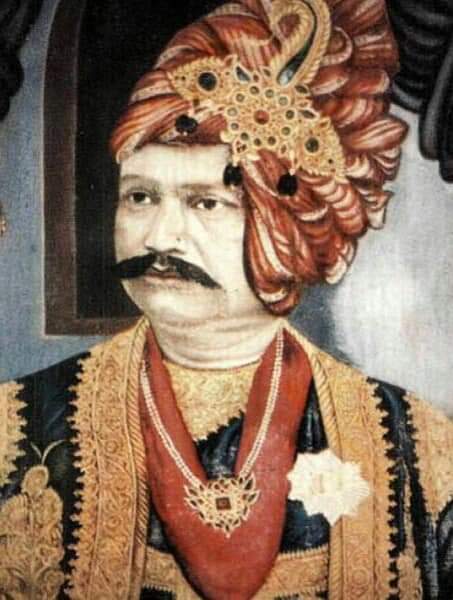
ଲେଖା: ଋଷିରାଜ ପଟ୍ଟନାୟକ
ବାମଣ୍ଡା ରାଜ୍ୟ ଥିଲା ଓଡ଼ିଶାର ଏକ ଆଦର୍ଶ ଗଡ଼ଜାତ ରାଜ୍ୟ । ଶୁଣାଯାଏ, ଉତ୍କଳର ଗଜପତି କପିଳେନ୍ଦ୍ର ଦେବଙ୍କ ପୁତ୍ର ସୁଭକ୍ତ ଏଠାରେ ରାଜୁତି କରୁଥିଲେ । ଫଳରେ ବାମଣ୍ଡାର ରାଜବଂଶ ନିଜକୁ ଗଙ୍ଗବଂଶୀ ବୋଲି କହିଥାଆନ୍ତି । କିନ୍ତୁ ପ୍ରଶ୍ନ ସୃଷ୍ଟି ହୁଏ ଗଜପତି କପିଳେନ୍ଦ୍ର ଦେବ ଯଦି ସୂର୍ଯ୍ୟବଂଶୀ ଥିଲେ । ବାମଣ୍ଡା ରାଜବଂଶ କିପରି ନିଜକୁ ଗଙ୍ଗବଂଶୀ ନିଜକୁ ବୋଲାଉଥିଲେ !
ରାଜବଂଶର ସନ୍ତକ ‘ଶଙ୍ଖ’ । ଏ ରାଜ୍ୟର ଆୟତନ ୧୯୮୮ ବର୍ଗମାଇଲ । ଗ୍ରାମସଂଖ୍ୟା ୧୦୪୫, ଦେବଗଡ଼ ରାଜ୍ୟର ରାଜଧାନୀ । ସାହିତ୍ୟ, ସଂସ୍କୃତି, କୃଷିବିକାଶ, ଟେଲିଫୋନ, ଜଳସେଚନ, ବିଦ୍ୟୁତ୍, ଡ଼ାକସେବା ଓ ମୁଦ୍ରାଯନ୍ତ୍ର ପ୍ରଚଳନ କ୍ଷେତ୍ରରେ ଏ ରାଜ୍ୟ ଆଗୁଆ ଥିଲା । ଏଠାରେ ସ୍ୱତନ୍ତ୍ର ରେଜେଷ୍ଟ୍ରି ଷ୍ଟାମ୍ପ ପ୍ରଚଳିତ ଥିଲା । ଏହା କେବଳ ଏ ରାଜ୍ୟର ଆଦର୍ଶ ଶାସକ ସାର୍ ବାସୁଦେବ ସୁଢ଼ଳଦେବ ଓ ତାଙ୍କ ସୁପୁତ୍ର ରାଜା ସଚ୍ଚିଦାନନ୍ଦ ତ୍ରିଭୁବନ ଗଙ୍ଗଦେବଙ୍କ ଯୋଗୁଁ ସମ୍ଭବ ହୋଇପାରିଥିଲା । ଓଡ଼ିଶାର ଲେଖକ, କବି, ସାହିତ୍ୟ ଓ ପଣ୍ଡିତମାନଙ୍କୁ ଏ ରାଜା ବିଶେଷ ସମାଦର ଓ ସମ୍ୱର୍ଦ୍ଧନା ପ୍ରଦାନ କରୁଥିଲେ ।
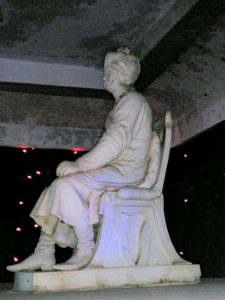
‘ସମ୍ୱଲପୁର ହିତୈଷିଣୀ‘ ନାମରେ ଏକ ସାହିତ୍ୟ ସଂସ୍କୃତିମୂଳକ ପତ୍ରିକା ଏଠାରୁ ପ୍ରକାଶ ପାଉଥିଲା । ଏଠାରେ ହାଇସ୍କୁଲ ଗଡ଼ଜାତ ଶାସନ ସମୟରୁ ପ୍ରତିଷ୍ଠିତ ହୋଇଛି । ବାମଣ୍ଡା ରାଜ୍ୟର ଶେଷ ସ୍ୱାଧୀନ ରାଜା ହେଉଛନ୍ତି ଶ୍ରୀ ଭାନୁଗଙ୍ଗ ତ୍ରିଭୁବନ ଦେବ । ସେ ୧୯୧୪ ମସିହା ଫେବ୍ରୁଆରି ୨୫ ତାରିଖରେ ଜନ୍ମହୋଇ ୧୯୨୦ରେ ଗାଦିପ୍ରାପ୍ତ ହୋଇଥିଲେ ।
The Bamanda or Bamra Princely State had an area of about 1,988 square miles, & it comprised some 930 villages, & one township, Deogarh, which had a population of 5,700 inhabitants during 1920s.
Sir Basudev Sudhal Dev, K.C.I.E., in the year 1903, administered the State with the assistance of three tahsildars, who were receivers of land revenues in their respective sub-divisions. These officials and other honorary magistrates disposed of criminal cases, but the Chief(ରାଜା), although supreme in the State, was compelled to have any sentences of death confirmed by the Commissioner of the division of Odisha.
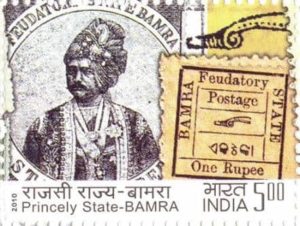
The relationship between the Bamanda State and the British Government was defined and regulations were promulgated by a Sanad in 1867, under which the Raja was recognized as a feudatory chief, & the annual tribute, which was liable to revision, but which was annexed in 1909 for thirty years :- payable from the State Exchequer:- was Rs. 7,500.
The various departments of the Bamanda State were controlled by able officials, & special attention was devoted to the preservation of village forests, which in the past had been recklessly destroyed by inhabitants. The State jungle included ten species of protected trees, and permission to fell these must be obtained from the Chief Officer of the Forest Department. No assessment was levied upon vendors of merchandise in the majority of the markets or bazars, but local storekeepers paid a small charge, which was levied pro rata [Proportional] upon the value of the goods sold. The people, therefore, were not unduly harassed by taxation, & it was significant that the average annual number of civil suits in the Courts didn’t exceed 400 for the whole State, & about 11%, of these plaints were for sums of less than Rs/-100. The principal industrial centre was at the jail at Deogarh, where prisoners were subjected to definite regulations regarding labour, & were taught weaving under modern methods, brick-making, oil-pressing, lime burning, and other useful & profitable trades.
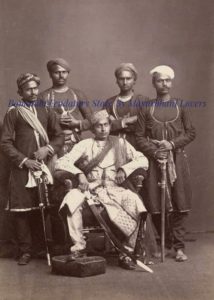
The King was deeply interested in the question of giving sound education to boys and girls, & the State maintained more than thirty schools, in addition to giving substantial assistance to a considerable number of private establishments. The principal crops are rice, oil-seeds, cotton, & sugar-cane, & the Chief, who was progressive in this as in other matters, had established a model farm of his own, upon which one saw modern agricultural machinery, & steam engines and up-to-date plant in factories & mills.
Experiments were carried on at this place, & every opportunity was given to villagers to acquire practical instruction in the problem of making the land as productive and as profitable as possible. Nearly 75%, of the population were engaged in agricultural pursuits at that time, while employment was found for a very large number of persons in saw-mills at Sirid, a village between Debagarh and Bamanda. The principal exports were iron, oilseeds, timber, pulses, & general forest produce (including lac, silk, resin, honey, and bee-wax), and the imports included mill-spun piece goods, salt, sugar, spices, and brass vessels.
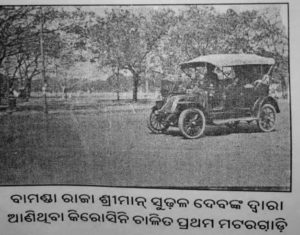
There were State dispensaries at Debagarh-ଦେବଗଡ଼, Kuchinda-କୁଚିଣ୍ଡା, and Barakote-ବାରାକୋଟ, & each one was in charge of a qualified medical officer, who attended to about six or seven thousand cases annually.
The opening of the Bengal Nagpur Railway had a very remarkable effect on trade generally, large areas of undeveloped land were brought into cultivation, agriculturists found new openings for the sale of their crops, & a new era of prosperity dawned over the whole State. Other means of communication were afforded by several good roads, and especially the one between Bamanda railway station and Debagarh, a distance of more than fifty miles, & by the Brahmani River, which was navigable for small open boats.Telegraph and telephone facilities were available at the principal places of the State, while the Imperial postal service had provided letter-boxes in the school houses in all of the large villages.
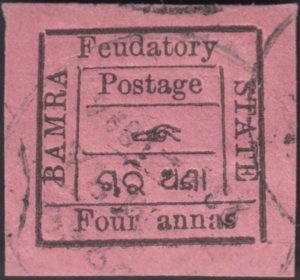
Debagarh, the headquarters of the State, was, according to an officially published Gazetteer, neatly laid out with a small park in the centre, the town was lighted by electricity, and a waterfall near at hand had been utilized to supply the town with a regular supply of water. A weekly paper was also published & a high school, affiliated to the Kolkata University, with a chemical & physical laboratory, was maintained by the State. There were several public buildings of an imposing character, including a masonry jail, police station, dispensary, & public courts & offices.
Bamanda, the principal railway station, was a depot for the export of a considerable number of sleepers from the State forests, and is, further, the residency of a large number of commercial and industrial firms.